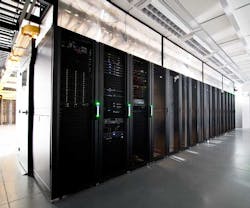Green House Data Boosts its Azure Mojo with Infront Acquisition
As it looks to the clouds, Green House Data is seeing Azure. The managed hosting company, which operates a national network of data centers, is acquiring Infront Consulting Group to boost its services for the Microsoft Azure cloud platform.
The transaction continues Green House Data’s pattern of growth through acquisition. The company has been opportunistic in expanding into new markets and new lines of business, pushing into cloud, managed services and high-touch IT consulting, slowly building a roster of enterprise customers.
Infront specializes in deplying and automating Microsoft applications and Microsoft Azure solutions. In March, Green House Data announced the addition of Azure management to complement the company’s existing colocation and managed services. Both entities will continue to operate under their respective brands.
“This really completes our move to being a full-service provider,” said Shawn Mills, CEO of Green House Data. “We started off as a colo and hosting company. We expanded across the country, and then added depth through acquisitions focused on services. What we had been missing was a solid hyperscale managed services play.
“Bringing Infront into the Green House Data family will only further our ability to help lead the IT transformation that allows our clients to capture market share and ultimately be successful,” Mills added. “It’s an exciting time, and there’s only more to come.”
Infront Brings Microsoft Platform Creds
Green House Data launched with a 10,000 square foot data center in Cheyenne, supported by wind energy and the Wyoming climate, which is well suited to “free” cooling, which takes advantage of cool outside temperatures to keep servers cool. The company now operates more than 100,000 square feet of data center space in eight markets, with access to more than 250 carriers, service providers, and content providers.
The company’s expansion is backed by a $16 million credit facility from Post Road Group last year, when the company also raised equity capital.
Infront Consulting is a Gold Managed Microsoft Partner, multi-year winner of Microsoft’s Partner of the Year Award, and both a Profit 500 and INC 5000 growth company. Founded in 2001, the company has helped architect and deploy IT solutions that support business growth and efficiency across the globe.
“More and more enterprises we’ve worked with have requested ongoing IT management as their consulting engagement concludes,” said Rory McCaw, CEO of Infront Consulting Group. “We saw a natural fit with Green House Data’s managed services expertise and an opportunity to organically expand into a more comprehensive platform.”
Sorting the Cloud Opportunities
Strategically, the deal with Infront accomplishes two goals for Green House Data – a deeper push into cloud services and working with larger customers.
“Our thesis was to merge with a company that has large enterprise experience with complex IT,” said Mills. “We’ve been focused on the mid-market.”
Infront fit the bill, as did its focus on Azure, which is the current focus of Green House Data’s cloud enablement ambitions.
Shawn Mills, CEO of Green House Data
“We took a look at the overall cloud market,” said Mills. “Amazon Web Services is obviously huge and continuing to grow. But when we look at the pace at which the two clouds (AWS and Azure) are growing, and adoption among our customer base, we felt a move toward Azure first made the most sense.”Mills said he expects Green House Data will add similar capabilities to support customers focused on Google Cloud Platform and AWS. Although cloud platforms are gaining enterprise customers, Mills believes we are still in the early innings of IT transformation.
“What we’re finding is that the enterprise needs help,” he said. “Everyone has started to adopt the cloud, but there are enterprises still running an enormous number of legacy applications. A lot of the hype is ‘hey, we’re all in.’ It’s much harder to move all this than they thought. They’ll continue to migrate into colo, and lift and shift stuff into the cloud.”
The active landscape for mergers and acquisitions adds another layer of complexity atop the cloud shift.
“Across many industries, there’s still a ton of consolidation,” said Mills. “It’s slowing them down and throwing their IT strategy into chaos, and addressing chaos requires more partners.”
About the Author



